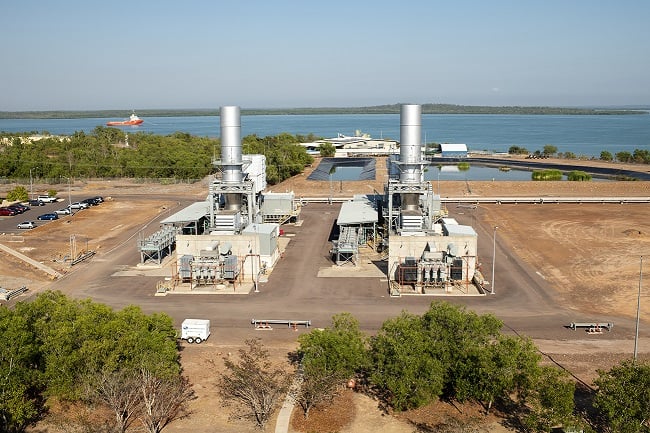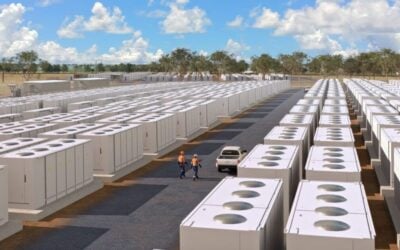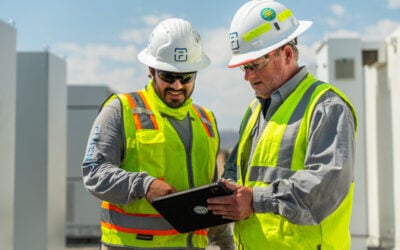
All 192 of the 3.5-tonne containerised batteries at the first large-scale battery energy storage system (BESS) in Australia’s Northern Territory have been installed.
The Northern Territory’s first foray into adding battery storage to its electricity networks comprises a 35MW, 1-hour duration (35MWh) system equipped with “grid-forming” advanced inverters. The NT government-led project is expected to cost around AU$45 million (US$29.89 million), but is forecast to deliver about AU$9.8 million of savings every year to the cost of running the regional electricity network.
Enjoy 12 months of exclusive analysis
- Regular insight and analysis of the industry’s biggest developments
- In-depth interviews with the industry’s leading figures
- Annual digital subscription to the PV Tech Power journal
- Discounts on Solar Media’s portfolio of events, in-person and virtual
On Sunday (14 May) NT chief minister Natasha Fyles and minister for renewables and energy Selena Uibo released a statement about the latest “milestone” reached at the Darwin-Katherine Battery, which as the name suggests, will support the region’s Darwin-Katherine Interconnected System.
Following the successful installation of all the batteries, the project has now reached the pre-commissioning phase, where test charge and discharge cycles will be performed. The battery is being islanded from the grid in testing, using a temporary power supply and AC/DC power converter.
It will be connected up to the network later this year, and is expected to go into full operation during the 2023-2024 financial year, the ministers said. It’s the first update on the project since November last year, when civil and building works were completed, as reported by Energy-Storage.news at the time.
“Commissioning is a complex and intensive process,” said Gerhard Laubscher, CEO of Territory Generation, the state-owned energy company overseeing the project. Laubscher said Territory Generation is “working closely with all stakeholders to support the fastest possible progression of these activities”.
Those stakeholders include Hitachi Energy, which provided and is integrating the BESS at a site adjacent to Channel Island, a gas power plant and currently the Northern Territory’s main source of centralised power generation.
The batteries will allow the Darwin-Katherine network to reduce its reliance on Channel Island’s fossil fuel-powered turbines, and instead leverage growing shares of distributed solar PV: like pretty much all of Australia, rooftop solar uptake is very high in the NT, with local government studies finding an increase of about 45% in rooftop installations annually since around 2010.
It will be used to test and try out a variety of applications for the BESS, including providing the spinning reserves that help integrate variable renewable energy to the grid, while its advanced inverters will enable it to deliver inertia to the network.
That’s a growing use case for batteries in Australia, with many of the country’s largest BESS assets either being kitted out with advanced inverters from Day One or being retrofitted with them. The federal government, through the Australian Renewable Energy Agency (ARENA), for example, is funding a number of such retrofit and new installations around the country.
Project partner Hitachi Energy can claim a pioneering position in this regard – the company delivered the first large-scale BESS to deliver ‘virtual’ synchronous inertia to an Australian network with a 2018 project in Dalrymple, South Australia. The company won the Darwin-Katherine project contracts through a competitive procurement process launched by the NT government in 2020 and awarded a year later.
While the Darwin-Katherine BESS (DK BESS) in the sparsely populated Northern Territory is clearly of an order of magnitude smaller than many of the large-scale BESS projects recently completed or underway across the rest of the country, it is significant for the NT.
The Darwin-Katherine electricity network supplies around 150,000 of NT customers with power, in a territory where the total population numbers just under a quarter of a million. Therefore, decarbonising it will be key to the territory reaching its goal of 50% renewable energy by 2030.
As well as installing the BESS next to Channel Island’s power plant, the NT government also recently ordered a new 22MW aeroderivative gas turbine to help further firm up the influx of renewable energy. The turbine is trailer-mounted, ‘hydrogen-ready’ and compatible with the 35MW BESS, according to manufacturer General Electric (GE), which is installing it in the expectation that if all goes well, much like the BESS, Territory Generation will order more units.
The government laid out the BESS’ role, and that of other initiatives like solar PV installations for schools and home solar and battery incentive schemes, in a 10-year plan published in 2021, which you can read here.
Energy-Storage.news’ publisher Solar Media will host the 1st Energy Storage Summit Asia, 11-12 July 2023 in Singapore. The event will help give clarity on this nascent, yet quickly growing market, bringing together a community of credible independent generators, policymakers, banks, funds, off-takers and technology providers. For more information, go to the website.






